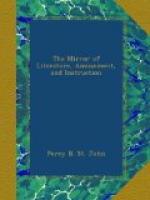“’Tis true thou nam’st
thy motley freight;
But from what source their birth they
date,
Mythology or history.
Old records, or the dreams of youth,
Dark fable, or transparent truth,
Is all to thee a mystery.
“Come tell me, Vagrant, in a breath,
Alcides’ birth, his life, his death,
Recount his dozen labours:
Homer thou know’st—but
of the woes
Of Troy, thou’rt ignorant as those
Dark Orange-boys, thy neighbours.”
’Twas thus, erect, I deign’d
to pour
My shower of lordly pity o’er
The poor Italian wittol,
As men are apt to do, to show
Their ’vantage-ground o’er
those who know
Just less than their own little.
When lo, methought Prometheus’ flame
Waved o’er a bust of deathless fame,
And woke to life Childe Harold:
The Bard aroused me from my dream
Of pity, alias self-esteem,
And thus indignant caroll’d:—
“O thou, who thus in numbers pert
And petulant, presum’st to flirt
With Memory’s Nine Daughters:
Whose verse the next trade-winds that
blow
Down narrow Paternoster-row
Shall ’whelm in Lethe’s
waters:
“Slight is the difference I see
Between yon Paduan youth and thee:
He moulds, of Pans plaster,
An urn by classic Chantrey’s laws,—
And thou a literary vase
Of would-be alabaster.
“Were I to arbitrate betwixt
His terra cotta, plain or mix’d,
And thy earth-gender’d
sonnet;
Small cause has he th’ award to
dread:—
Thy Images are in the head,
And his, poor boy, are on
it!”
New Monthly Magazine.
* * * * *
PUNCH.
Punch was first made by the English at Nemle, near Goa, where they have the Nepa die Goa, commonly called arrack. This fascinating liquor got the name of punch, from its being composed of five articles—that word, in the Hindostanee language, signifying five. The legitimate punch-makers, however, consider it a compound of four articles only; and some learned physicians have, therefore, named it Diapente (from Diatesseron,) and have given it according to the following prescription—
Rum, miscetur aqua—dulci miscetur
acetum,
fiet et ex tali foedere—nobile
Punch.
and our worthy grand-fathers used to take a dose of it every night in their lives, before going to bed, till doctor Cheyne alarmed them by the information, that they were pouring liquid fire down their throats. “Punch,” said he, “is like opium, both in its nature and manner of operation, and nearest arsenic in its deleterious and poisonous qualities; and, so,” added he, “I leave it to them, who, knowing this, will yet drink on and die.”
Who, that has drunk this agreeable accompaniment to calapash, at the City of London Tavern, ever found themselves the worse for it? They may have felt their genius inspired, or their nobler passions animated—but fire and inflammation there was none. The old song says—




